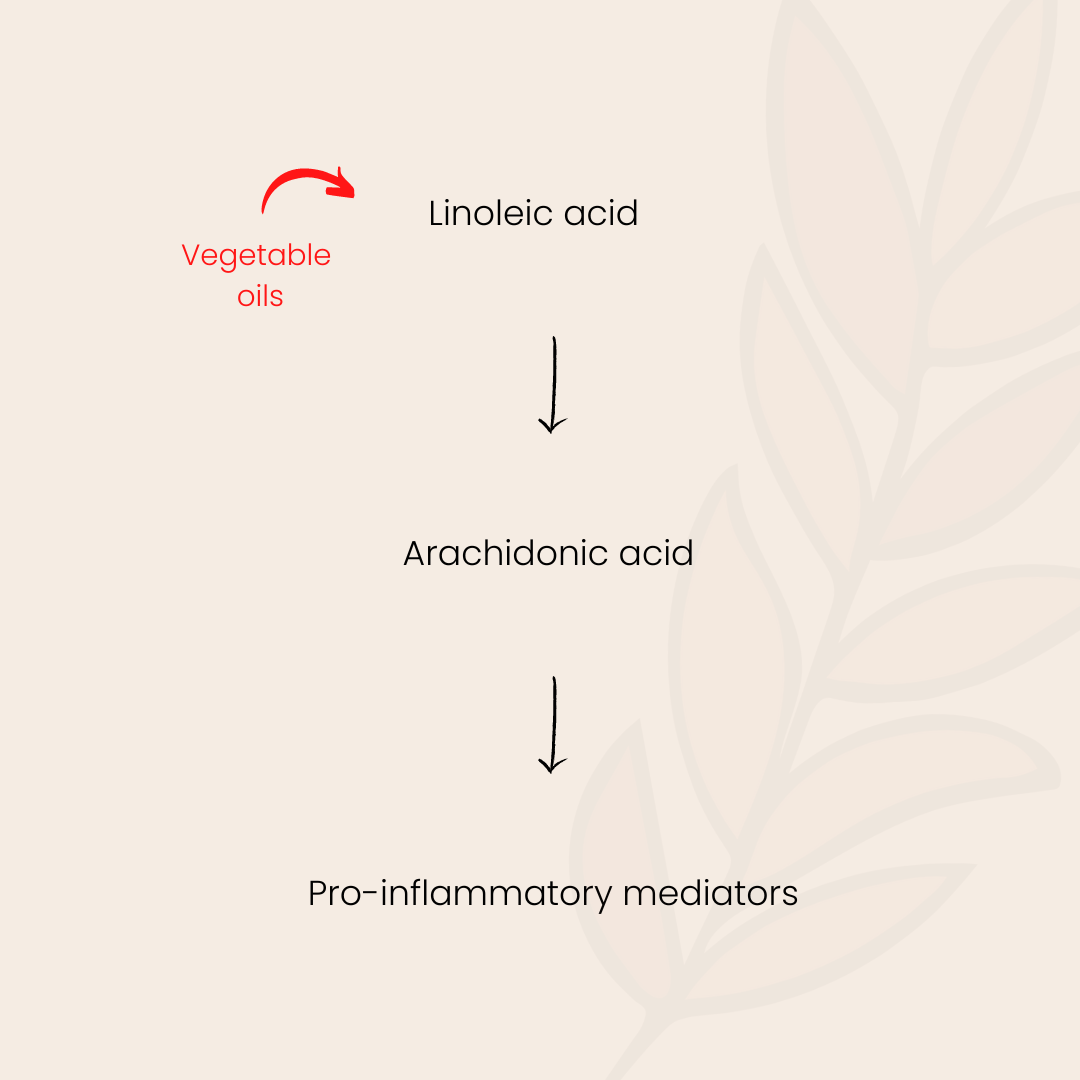The health risks associated with vegetable oils
When was the last time you consumed soybean oil, vegetable oil, cottonseed oil, safflower oil, peanut oil, rice bran oil, canola oil, sunflower oil, grapeseed oil, corn oil or sunflower oil? Chances are it was recently! In this blog I cover why these oils are inflammatory, the health risks that are associated with high consumption, what makes them bad for our health, where they are found, what you should choose instead and my top tips for avoiding/minimising them.
There’s one thing that all of these vegetable (or Industrialised seed) oils have in common and that is that they are EVERYWHERE and high in linoleic acid (LA), an omega-6 polyunsaturated fatty acid. When LA is consumed in large amounts, which it often is, it promotes arachidonic acid production and subsequently numerous pro-inflammatory mediators called eicosanoids.
Omega-6 fatty acid pathway.
Eicosanoids are capable of increasing inflammatory biomarkers such as interleukin-6, C-reactive protein and tumor necrosis factor-a and triggering a whole inflammatory cascade [1]. When this cascade is triggered, many other inflammatory mediators are produced which compromises our immune function and may promote the development and progression of various chronic diseases. They include but are not limited to autoimmune diseases, coronary heart disease, atherosclerosis, cardiovascular disease, diabetes, cancer, non-alcoholic fatty liver disease, obesity, arthritic conditions, eczema, psoriasis, acne and Alzheimer’s disease [1, 2, 3, 4, 5].
Why are these oils so bad for our health?
A ratio exists between omega-6 and omega-3 fatty acids, however; it is controversial but is thought to be anywhere from 1:1 to 4:1. Alpha linolenic acid, eicosapentaenoic acid (EPA) and docosahexaenoic acid (DHA) make up omega-3 fatty acids and exhibit anti-inflammatory actions within the body. Omega-3 fatty acids primarily come from seafood (salmon, herring, mackerel and sardines), flax seeds, pumpkin seeds, walnuts and hemp seeds. High consumption of omega-6 fatty acids will cause an imbalance between the omega-6 and omega-3 ratio which will lead to inflammation and increase the risk of the chronic diseases mentioned above [6].
Omega-6 and omega-3 fatty acid pathways.
However, part of the reason these oils are so inflammatory is their susceptibility to oxidation and how they are made in the first place. These oils oxidise easily when exposed to heat or are left opened for long periods of time regardless of their recommended shelf life [7]. Once oxidation occurs these oils give rise to highly reactive compounds which causes oxidative stress and inflammation within the body [7]. These oils are highly processed and use unnatural methods for extraction such as oil mills and chemical solvents.
Where are these oils found?
Vegetable oils are sold on their own or found in various processed and packaged foods including condiments, store baked goods, foods purchased from the "health" food isle at the supermarket, pre-marinated meats, dairy products, deep fried foods etc.
What should I choose instead?
Far better options include oils that use natural extraction processes by crushing or pressing the material. These oils are also higher in monounsaturated fats which makes them stable and far less likely to oxidise upon heat exposure. They include avocado oil, extra virgin olive oil and coconut oil.
Avoiding omega-6 oils
My top tips to avoid these oils are:
Always read the ingredient labels on packaged foods and avoid the oils mentioned at the start of this blog
Avoid buying these oils on their own and opt for one of the more stable oils instead
Minimise deep fried food
Increase foods high in omega-3 fatty acids to keep the omega-6 to omega-3 ratio low
There you have it, the information on the effects of vegetable (or industrialised seed) oils and the harm that can arise from consuming them on a regular basis is well documented. You may like to implement some of the above tips to avoid/minimise them or share this blog with someone who could benefit from it.
Yours in health and happiness,
Ebony x
References:
[1] Fritsche, K. L. (2014). Linolenic acid, vegetable oils and inflammation. Missouri Medicine, 111(1), 41-43. Retrieved from https://www.ncbi.nlm.nih.gov/pmc/articles/PMC6179509/
[2] DiNicolantonio, J. J., & O’Keefe, J. H. (2018). Omega-6 vegetable oils as a driver of coronary heart disease: the oxidized linoleic acid hypothesis. Open Heart, 5(2). http://dx.doi.org/10.1136/openhrt-2018-000898
[3] Patterson, E., Wall, R., Fitzgerald, G. F., Ross, R. P., & Stanton, C. (2012). Health implications of high dietary omega-6 polyunsaturated Fatty acids. Journal of nutrition and metabolism, 2012, 539426. https://doi.org/10.1155/2012/539426
[4] Balić, A., Vlašić, D., Žužul, K., Marinović, B., & Bukvić Mokos, Z. (2020). Omega-3 Versus Omega-6 Polyunsaturated Fatty Acids in the Prevention and Treatment of Inflammatory Skin Diseases. International journal of molecular sciences, 21(3), 741. https://doi.org/10.3390/ijms21030741
[5] Antonelli, A., Ferrari, S. M., Corrado, A., Di Domenicantonio, A., & Fallahi, P. (2015). Autoimmune thyroid disorders. Autoimmunity reviews, 14(2), 174–180. https://doi.org/10.1016/j.autrev.2014.10.016
[6] CiNicolantonio, J. J., & O’Keefe, J. H. (2018). I mportance of maintaining a low omega–6/omega–3 ratio for reducing inflammation. Open Heart, 5(2). http://dx.doi.org/10.1136/openhrt-2018-000946
[7] Nogueira, M. S., Scolaro, B., Milne, G. L., & Castro, I. A. (2019). Oxidation products from omega-3 and omega-6 fatty acids during a simulated shelf life of edible oils. LWT, 101, 113-122. https://doi.org/10.1016/j.lwt.2018.11.044


